I’ll write about the books in a separate post, but below are some quick thoughts about Tomb Raider, which opens Friday, and Collateral, the four-episode miniseries available now on Netflix.
Tomb Raider

MGM
I went in with very low expectations and was surprised when I didn’t find myself incessantly rolling my eyes. I can’t imagine this was the best project offered to Alicia Vikander after she won an Oscar, but the always riveting actress is the reason Tomb Raider is watchable. And hey, Angelina Jolie also chose to play Lara Croft after she won her Oscar so what do I know?
Vikander gives Lara a welcome vulnerability and grounds the action in this world even as Lara chases artifacts from ethereal realms. Yes, her arms and abs are corded with muscles, but her most impressive features remain her expressive and intelligent eyes, which let us know she can handle herself in tough situations.
The first half of the movie covers how Lara goes from being a broke bike courier to badass treasure hunter, and the second half resembles a video game that really wants to be Raiders of the Lost Ark. It doesn’t come close, but Vikander makes it palatable and you don’t feel stupider afterward.
Collateral

BBC
On paper, it sounds like this miniseries covers too many timely issues: anti-immigration sentiment, racism, fear of terrorism, sexual harassment, PTSD, human trafficking, drugs, and a church’s resistance to gay female vicars.
But somehow Collateral makes it all work without being preachy, wrapping everything up in a mystery surrounding the assassination of a pizza delivery man. In this way the show reflects real life, where we have to deal with multiple obstacles every day.
As Detective Inspector Kip Glaspie, Carey Mulligan gives the most quietly commanding performance I’ve seen from her. Jeany Spark is haunting as Captain Sandrine Shaw, an intense war veteran who only wants to protect her country but no one protects her when she needs help. And it’s always wonderful to see Nicola Walker (Ruth from Spooks/MI-5), playing a vicar who must choose between her own needs and those of her parish. I was slightly annoyed, though, that her lover, Linh, is Vietnamese but played by an actress (Kae Alexander) who obviously isn’t.
Written by lauded playwright/screenwriter Sir David Hare and directed by S.J. Clarkson, Collateral is a thought-inducing show about the complex times we’re living in, and the compromises that are sometimes made in order to do the right thing.
]]> If you haven’t heard already, let’s just get this out of the way: Michael Fassbender goes full frontal and this movie is rated NC-17. But neither is the reason you should see it. Despite its provocative elements, the most memorable thing about Shame is Fassbender’s raw, fearless performance.
If you haven’t heard already, let’s just get this out of the way: Michael Fassbender goes full frontal and this movie is rated NC-17. But neither is the reason you should see it. Despite its provocative elements, the most memorable thing about Shame is Fassbender’s raw, fearless performance.
Brandon (Fassbender) is a sex addict, a guy who can’t get through the day without surfing porn sites at work and taking bathroom breaks to relieve himself in a way that doesn’t fall under number one or two. But he can’t do it when emotional connections are involved; the sex has to be anonymous and meaningless.
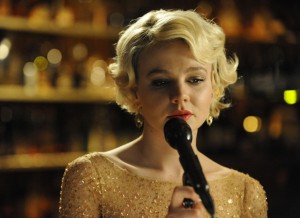 All this comes to a head when his sister Sissy (Carey Mulligan, who also appears nude) shows up at his place and asks to stay for an unspecific amount of time. The two have a prickly relationship, she has her own issues, and they both descend into their separate hell before there’s hope that they might start to heal.
All this comes to a head when his sister Sissy (Carey Mulligan, who also appears nude) shows up at his place and asks to stay for an unspecific amount of time. The two have a prickly relationship, she has her own issues, and they both descend into their separate hell before there’s hope that they might start to heal.
If the synopsis sounds skimpy, it’s because this is more a character study, which is not normally my bag since I’m more into plot-driven movies. The subject matter isn’t something I’m usually drawn to, and Brandon and Sissy aren’t exactly lovable. So why do I recommend it? Because Fassbender’s hypnotic work—yes, his acting—made it impossible for me to look away, and weeks after I saw it, his performance still resonates as one of the most powerful I’ve seen this year.
Despite Brandon’s problem, Fassbender makes him sympathetic. He’s not lascivious or skeevy; he’s quite the gentleman to women he has feelings for (he calls up prostitutes to feed his addiction). His physical nudity isn’t as striking as the emotional nakedness. There’s a scene when Brandon, in the middle of a sex act, suddenly has a look of self-loathing that’s so startlingly painful, it’s the most graphic shot in the film. And this is with the camera staying tight and long on Fassbender’s face.
Ah, his face—the most valuable asset in Shame. Director/writer (with Abi Morgan) Steve McQueen likes long, close-up takes, and not every actor has enough confidence or skill to withstand them. Luckily, the leads here are up to the task, even if I found some of those long takes unnecessary. Mulligan sings New York, New York in a slow jam with the camera examining her every pore for what felt like half an hour—why?
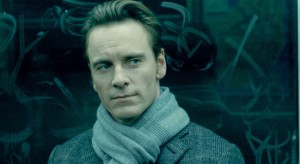 More effective are the extended shots of Brandon on the subway, looking at the female passengers around him. He sits perfectly still, but you can see everything happening in his eyes—the moment he latches on to a possible conquest, what he’s thinking about doing with her, how he’ll feel about it afterward. He might experience some shame, but for this performance, Fassbender can be proud.
More effective are the extended shots of Brandon on the subway, looking at the female passengers around him. He sits perfectly still, but you can see everything happening in his eyes—the moment he latches on to a possible conquest, what he’s thinking about doing with her, how he’ll feel about it afterward. He might experience some shame, but for this performance, Fassbender can be proud.
Nerd verdict: Powerful Shame
Photos: Fox Searchlight/Abbot Genser
]]>
In this coming-of-age movie, 16-year-old Jenny (Carey Mulligan) receives quite an education—in academics, sex, music and fine living. She owes most of this to her much older lover, David (Peter Sarsgaard), whom she meets one day in the rain when he offers to shelter her cello, if not her, in his car.
 Soon, she and David are devising ways to convince her parents to let her go out with him to dinners, dancing and even Paris (there’s a romantic Parisian montage which made me ache to go). Her stellar school grades plummet and her goals of attending Oxford begin to recede. Like David, it seems Jenny would rather attend the “University of Life,” much to the chagrin of her teachers. Her glamorous experience abruptly ends, however, after an upsetting discovery, forcing her to re-examine what kind of education she really wants.
Soon, she and David are devising ways to convince her parents to let her go out with him to dinners, dancing and even Paris (there’s a romantic Parisian montage which made me ache to go). Her stellar school grades plummet and her goals of attending Oxford begin to recede. Like David, it seems Jenny would rather attend the “University of Life,” much to the chagrin of her teachers. Her glamorous experience abruptly ends, however, after an upsetting discovery, forcing her to re-examine what kind of education she really wants.
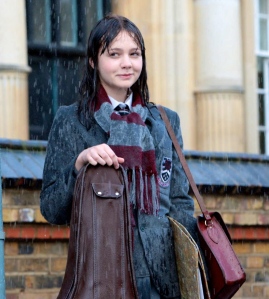 You may or may not have heard of Mulligan (she played Kitty Bennet in the 2005 Pride and Prejudice with Keira Knightley) but I believe she will be well known here in the States very soon. The 24-year-old actress believably conveys the giddiness and innocence of a 16-year-old, then blossoms before our very eyes into a sophisticated young woman—with her plummy voice and gazelle legs—who learns a lesson she won’t forget. The movie is based on the life of British journalist Lynn Barber, who wrote an article about her rude awakening.
You may or may not have heard of Mulligan (she played Kitty Bennet in the 2005 Pride and Prejudice with Keira Knightley) but I believe she will be well known here in the States very soon. The 24-year-old actress believably conveys the giddiness and innocence of a 16-year-old, then blossoms before our very eyes into a sophisticated young woman—with her plummy voice and gazelle legs—who learns a lesson she won’t forget. The movie is based on the life of British journalist Lynn Barber, who wrote an article about her rude awakening.
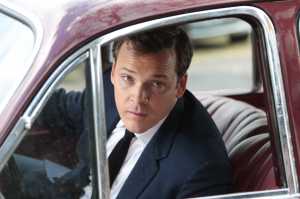 I found the casting of Sarsgaard a bit problematic. While I think he’s an extremely talented actor who does good work here, he brings with him cinematic baggage from often playing edgy/smarmy guys who can’t be trusted. David is supposed to be a suave and classy gentleman who not only seduces Jenny, he charms her parents into practically pushing their daughter into his arms. Knowing Sarsgaard doesn’t do the straight-up, nice-guy thing, I kept waiting for the other shoe to drop and when it does, the impact is muted.
I found the casting of Sarsgaard a bit problematic. While I think he’s an extremely talented actor who does good work here, he brings with him cinematic baggage from often playing edgy/smarmy guys who can’t be trusted. David is supposed to be a suave and classy gentleman who not only seduces Jenny, he charms her parents into practically pushing their daughter into his arms. Knowing Sarsgaard doesn’t do the straight-up, nice-guy thing, I kept waiting for the other shoe to drop and when it does, the impact is muted.
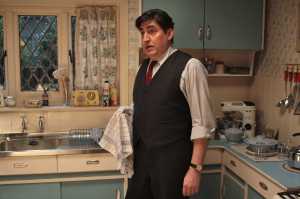 Among the stellar supporting cast, Alfred Molina stands out as Jenny’s blustery father, who at first pressures his daughter to strive for Oxford but then thinks maybe a rich man would be better for her future. Despite the character’s temper, Molina makes him sympathetic, a father who simply wants to assure his daughter’s well-being in an age where professional options for women were limited. Olivia Williams turns in a subtle yet effective performance as Jenny’s teacher, a “spinster” whom Jenny eventually sees in a different light. Rosamund Pike, known for playing classy or icy smart women, displays her comedic chops as a dim-witted blonde who often parties with Jenny and David and her own boyfriend, Danny (Dominic Cooper).
Among the stellar supporting cast, Alfred Molina stands out as Jenny’s blustery father, who at first pressures his daughter to strive for Oxford but then thinks maybe a rich man would be better for her future. Despite the character’s temper, Molina makes him sympathetic, a father who simply wants to assure his daughter’s well-being in an age where professional options for women were limited. Olivia Williams turns in a subtle yet effective performance as Jenny’s teacher, a “spinster” whom Jenny eventually sees in a different light. Rosamund Pike, known for playing classy or icy smart women, displays her comedic chops as a dim-witted blonde who often parties with Jenny and David and her own boyfriend, Danny (Dominic Cooper).
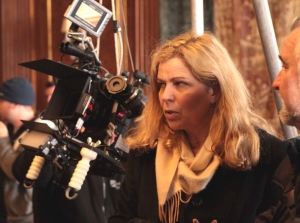 Danish director Lone Scherfig, in her American feature debut, does a nice job guiding the actors to strong performances, which is crucial in a film that’s more character study than plot-driven. Novelist Nick Hornby wrote the screenplay, peppering it with his usual humor and smart dialogue, and consulted on the music, which is 1960s groovy.
Danish director Lone Scherfig, in her American feature debut, does a nice job guiding the actors to strong performances, which is crucial in a film that’s more character study than plot-driven. Novelist Nick Hornby wrote the screenplay, peppering it with his usual humor and smart dialogue, and consulted on the music, which is 1960s groovy.
Scherfig, Sarsgaard, Mulligan, Cooper and Williams showed up to do Q & A at the Variety screening I attended. Insights gleaned from the session:
- Sarsgaard is handsome and personable in real life, not creepy at all.
- Mulligan is sporting a chic pixie cut and will use an American accent for her role as Gordon Gekko’s daughter, Winnie, in Oliver Stone’s Wall Street 2: Money Never Sleeps, currently shooting in NY. She’s more sophisticated in person than in Education, speaking in a lower register and showing no signs of Jenny’s gigglyness.
- Cooper, whose on-screen presence has never made any impression on me, was hilarious in person. He had a funny answer to everything and was very flirtatious without being obnoxious.
- Scherfig is a smart, fascinating woman. She said the people she’s inspired by are completely different from the people who influence her work. Example: She gets a lot of advice from Lars von Trier (Antichrist) and admires him but would never try to do anything resembling his work.
- Williams identified with her role as Jenny’s teacher in the film because she’s a grammar nerd. (Love that!) She said the crew on her current Fox series, Dollhouse, is constantly teasing her for picking out split infinitives and dangling prepositions in the scripts.
Nerd verdict: A worthwhile Education
All photos by Kerry Brown, courtesy Sony Pictures Classics
]]>